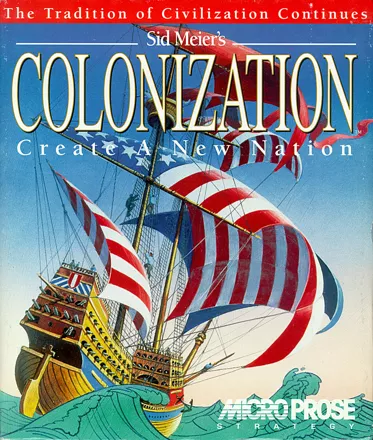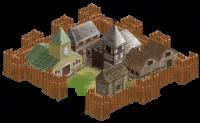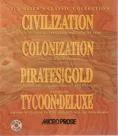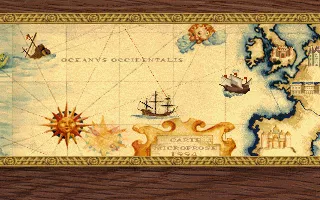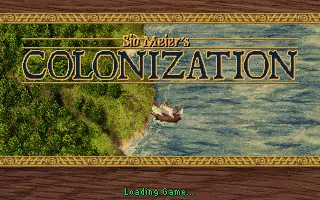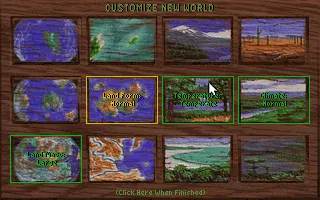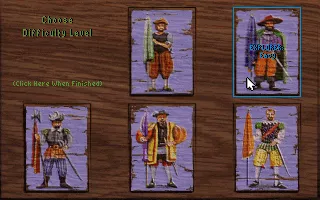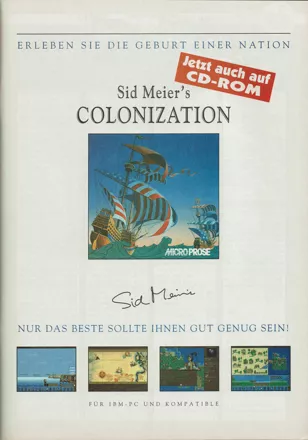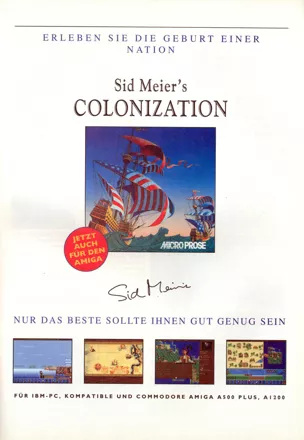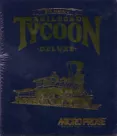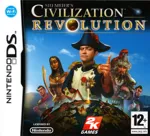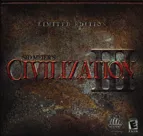Sid Meier's Colonization
Description official descriptions
Sid Meier's Colonization is a strategy game which puts you in the role of Viceroy of the New World. You are sent by your King and country to establish colonies in the newly-discovered Americas that lie to the west. You face many of the same challenges that faced colonial organizers of the time-competition from other Old World powers, strange native cultures, the problems of establishing profitable trade programs, and the problems of organizing an army from a rag-tag band of colonists.
The game begins with the European discovery of the Americas (1500) and continues until approximately the time of the American Revolution (1800). In the beginning of the game you are given a trading/exploration ship and a small group of colonists. You have no knowledge of what lies ahead of your ship, so you must explore until you find a suitable spot to lay down your first colony. As your colonies grow larger and larger, you inevitably encounter native populations and are confronted with competing imperial powers from the Old World.
Each of your colonies is populated by a number of colonists, who you can assign to various tasks. Some chop wood, mine for ore and collect plants outside the colony, some others stay inside to turn those raw materials into more valuable cargo - such as rum (made from sugar), coats (made of furs) or hammers (made of lumber). Hammers which aren't a cargo you can sell, but represent the speed with which you construct new buildings in your colony. Some colonists are specialists, and thus are more effective at a certain job.
The cargo you collect and produce is an important thing. You can take it to Europe to sell, and earn money to buy some other necessary things, hire colonists (though new, willing colonists appear in Europe by themselves) or buy ships and artillery. You can also trade it with the Indians or colonies of other nations.
You'll construct various buildings in your colonies. They have a lot of different functions: some of them can improve the speed with which you produce valuable cargo, others allow you to defend yourself from attacks more easily or construct ships and artillery. Some buildings require you to spend a number of valuable Tools when constructed, though you can make new Tools out of ore.
As you explore the land, you'll come across the Indian villages and some "places of interest" which can be investigated. A colonist that enters an Indian village can be welcomed with open hands, and the natives will reveal a map of nearby lands, or teach him a profession. Investigating places of interest has various consequences: sometimes you'll find nothing, sometimes you'll be killed for trespassing on ancient burial ground, but sometimes you'll find treasure! (Taking this treasure to Europe can be difficult though - if you don't have a sufficiently big ship, the King will agree to transport it for you... if you give him 50% of the gold).
To defend yourself from enemies, you'll want to have some military units. Just give a colonist a musket and he'll turn into a Soldier, give him a horse, and he's a Scout or a Dragoon. However, such a warrior is typically inexperienced, though he might gain military experience in battle. Artillery is also good at defense, but don't try to leave your colonies with it - in the open field, it is useless.
As you progress in the game, you'll feel that working for the King is getting more and more annoying, especially since he keeps raising your taxes, thus decreasing your income from sold goods. Your colonies produce "Liberty Bells", which increase rebel sentiment in the colonies. If the majority of colonists supports your yearning for freedom, you can declare independence. But when you do that, you'll have to deal with the King's expeditionary force arriving to teach you a lesson. If you manage to defeat all his incoming armies and emerge victorious from the American Revolutionary War, you've won!
Groups +
- Colonization series
- Games with downloadable official map/level editors
- Games with randomly generated environments
- Games with the creator's name
- Green Pepper releases
- Historical conflict: American Revolutionary War
- Merchant / Trade-oriented games
- Powerplus releases
- Setting: Aztec
- Setting: Inca
- Sid Meier's licensees
Screenshots
Promos
Videos
See any errors or missing info for this game?
You can submit a correction, contribute trivia, add to a game group, add a related site or alternate title.
Credits (DOS version)
28 People · View all
| Design | |
| Programming | |
| Art Direction | |
| Computer Art | |
| Music Composition and Arranging | |
| Sound Programming | |
| Documentation | |
| Editor | |
| Manual Design / Layout | |
| [ full credits ] | |
Reviews
Critics
Average score: 86% (based on 30 ratings)
Players
Average score: 3.9 out of 5 (based on 153 ratings with 9 reviews)
Great game. Kept me up well after midnight a lot of times.
The Good
All the different things/ways you can play it. Each game is like a new game. Sound is not to bad.--Sid Meier classic.
A game in my list of top 10 games ever played.
The Bad
The music, normal I like the music in games, but the music is the first thing I put of when I play this game.
The Bottom Line
I game you either love it with you whole heart or you had it.
DOS · by MajorDad (515) · 1999
The Good
This game looks and plays a lot like the designer's classic Civilization game. The difference is that while that game was won by expansion of your civilization and developing technology, this game is won by careful development of your cities and trade. This game is really more about economics than military conquest.
In Colonization you are given different types of prospective colonists with various skills (or lack of skills) and you decide whether to sail them from the Old World to the New. Then you have to get those colonists to where you can take full advantage of their skills. So you'd want to get the miners close to mountains and distillers close to sugar supplies, etc. You then want to arrange trade routes between your cities so you can get your raw materials shipped to cities that can then upgrade it to more refined and valuable goods. Ultimately you can ship your raw or manufactured goods back to the Old World for profit.
Eventually you will reach a point where you will declare independence and have to fight a revolutionary war. Your success in this war is heavily dependent upon how well you fortified your cities and built a strong, diverse economy prior to independence.
The Bad
To get your cities productive will require a lot of micro management of your cities. While I really enjoyed this at first. As I got better at the game it became a bit of a nuisance moving colonists around. I think if the computer could have managed some aspects for you it would have cut down on all the mouse clicking.
But the real sore point of the game is its frustrating combat system. In this game you don't really damage or destroy units, instead, when beaten, a unit downgrades. So after a battle a military unit would loose all its guns making it a normal colonist until you armed it again. While this fits the games focus on economics, it makes for fighting wars very frustrating. After a hard fought battle, unless you had extra troops to mop up the beaten armies they would retreat and return a few turns later rearmed with weapons. This wouldn't be so bad if it weren't for the fact that fighting the King's army is very difficult on the harder settings. I understand that it was made this way to stress the importance of developing your colony's manufacturing . But I think there could have been a better way to portray this in the game.
The Bottom Line
Despite its flawed combat system this game is quite addictive. You will have many late nights perfecting cities and trade routes as you prepare for independence.
DOS · by woods01 (129) · 2002
Great variation on the Civ theme, more trade oriented, like Merchant Prince
The Good
A nicely woven trade context, you can harvest many different goods, process them to varying levels of refinement, ship intermediates between towns (like RRT) then trade them either back in Europe, with other Civs, or with the indians, to reap huge profits. It allows rapid expansion if that's your style. It allows temporary cities (build, then later dismantle) if that's your style again. You can fight others, or grow peacefully, relatively unhindered.
The Bad
It can get a little too peaceful, if you're not attacking anybody. You can go for 200 turns without a war, which is fine, if you like merchant/trade simulations. The military units never advance in technology, which is historically realistic, but a paradigm shift for seasoned CIV style gamers. The graphics are of course 1994 state-of-the-art, but that was amply sufficient for me, since the spreadsheet engine underlying the graphics is no worse than that of Civ 3. At least the AI doesnt cheat so much in Colonization.
The Bottom Line
DOS and Windows versions virtually identical, I play both (I find the interface more smooth in DOS.
You settle and build cities like other Civ games. You can engage in trade and make money, or attack and rob the Indians and make money. You can get $100 for a good or $1000, depending who you go to trade with and what they need at that time.
You can conduct shallow trade, with inexperienced workers right from the start and make a little money. Or you can go deep, develop the land, train workers to be specialists, and built industrial infrastructures, to make 5 to 10 times more money from trade. If you want to be peaceful, the AI pretty much can leave you alone to develop and grow peacefully, and build an economic powerhouse.
But there is ultimately a war you need to prepare for. The war of Independence, which you have to spend 200-300 turns preparing for, and to win it, you will need every cannon, every cavalry, and every fortification (and every dollar) you could possibly have built during those peace years.
DOS · by Adrian Pascaso (4) · 2004
Discussion
| Subject | By | Date |
|---|---|---|
| Colonization Gold Multimedia | Lantizia (105) | Dec 31, 2019 |
Trivia
Amiga version
Although Sid Meier's previous Amiga strategy games, Civilization and Railroad Tycoon, were system-friendly and could run on a multitasking system, they kept their custom user interfaces from the PC versions. Colonization, on the other hand, made use of the normal AmigaOS GUI, making for movable and resizable windows. This also meant that you could run Colonization on the Workbench screen, by starting the game with WORKBENCH as an argument.
Development
Colonization was the fourth game that Sid Meier protege Brian Reynolds worked on with MicroProse. The game began as a "spare time" project for Reynolds until it was noticed by the rest of the company. Because the game underwent many significant changes during playtesting, Sid Meier cites the game as proof that designers can (and perhaps should) continue to make changes and improvements up until the last possible minute.
Indians
Colonization was considered somewhat controversial by the press at the time of the release because it portrayed the European conflict with the American Indians but completely excluded the issue of slavery from the game's model.
An interesting change in dialog occurs in relation to Indian wars after a colony gains its independence. When interacting with other European countries before independence, the player can merely ask them if they want to wage war against the Indians. After gaining independence, they can be asked if they want the player (or vice versa) to place the Indians in reservation camps.
Historically, the relations between the native Indians and the invaders are gruesome, if not downright degrading. The first arrivals from Spain and Portugal introduced various diseases to the local populace.
The United States of America traded smallpox-infested blankets with the Indians, introducing biological warfare before the concept was established and sold whiskey to a nation of people who did not have the genes to break down the alcohol naturally.
Awards
- Amiga Joker
- Issue 02/1996 – #2 Best Game in 1995 (Readers' Vote)
- Issue 02/1996 – #2 Best Simulation in 1995 (Readers' Vote)
- PC Powerplay (Germany)
- Issue 11/2005 - #5 Game Which Absolutely Needs A Sequel (it eventually was remade as a standalone expansion for Sid Meier's Civilization IV in 2008)
Information also contributed by Игги Друге and Indra was here
Analytics
Upgrade to MobyPro to view research rankings and price history! (when applicable)
Related Sites +
-
Colonization Fan Page
The ultimate Colonization fan page. Contains game info, strategy, downloads, forum and more. -
Colonization Forum Newsgroup
Some useful nuggets of info. about Colonization and a couple of polls. -
Hooked on Civ IV: Colonization
Fansite for both the old (1994) and new (2008) version of Sid Meier's Colonization. -
The Unofficial Microprose Colonization Home Page
All you can and should know about Microprose Colonization and more. A must of a Colonization fan. -
freecol - a Colonization Clone
Freecol site about a clone of Colonization currently at Version 0.3.0 . Lots of pictures and info., download a copy. It's very professional. The game's very professional. So far they have the Europe screen, map, units and you can build a colony.
Identifiers +
Contribute
Are you familiar with this game? Help document and preserve this entry in video game history! If your contribution is approved, you will earn points and be credited as a contributor.
Contributors to this Entry
Game added by MajorDad.
Amiga added by Rebound Boy. Linux added by Sciere. Windows 16-bit added by Terok Nor. Macintosh added by Игги Друге. Windows added by Longwalker.
Additional contributors: PCGamer77, Sergio Brinkhuis, David Ledgard, Havoc Crow, formercontrib, hlejr0, Patrick Bregger, Plok.
Game added November 2, 1999. Last modified November 5, 2024.


